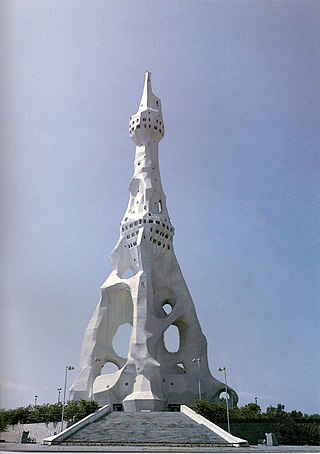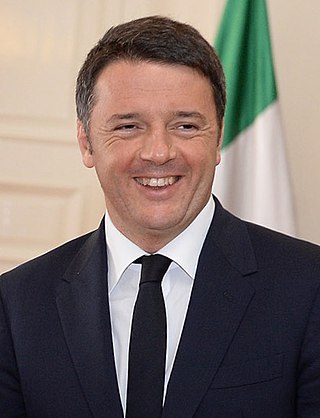Related Research Articles

Nichiren Shōshū is a branch of Nichiren Buddhism based on the traditionalist teachings of the 13th century Japanese Buddhist priest Nichiren (1222–1282), claiming him as its founder through his senior disciple Nikko Shonin (1246–1333), the founder of Head Temple Taiseki-ji, near Mount Fuji. The lay adherents of the sect are called Hokkeko members. The Enichizan Myohoji Temple in Los Angeles, California serves as the temple headquarters within the United States.

Komeito, formerly New Komeito (NKP) and commonly referred to as simply Komei, is a political party in Japan founded by members of the Buddhist movement Soka Gakkai in 1964. It is generally considered centrist and conservative. Since 2012, it has served in government as the junior coalition partner of the nationalist and conservative governments led by the Liberal Democratic Party.

Soka Gakkai is a Japanese Buddhist religious movement based on the teachings of the 13th-century Japanese priest Nichiren. It claims the largest membership among Nichiren Buddhist groups.

Daisaku Ikeda was a Japanese Buddhist leader, author, philosopher, and educator. He served as the third president and then honorary president of the Soka Gakkai, the largest of Japan's new religious movements.

Gohonzon (御本尊) is a generic term for a venerated religious object in Japanese Buddhism. It may take the form of a scroll or statuary. The term gohonzon typically refers to the mainstream use of venerated objects within Nichiren Buddhism, referring to the calligraphic paper mandala inscribed by the 13th Japanese Buddhist priest Nichiren to which devotional chanting is directed.

Japanese new religions are new religious movements established in Japan. In Japanese, they are called shinshūkyō (新宗教) or shinkō shūkyō (新興宗教). Japanese scholars classify all religious organizations founded since the middle of the 19th century as "new religions"; thus, the term refers to a great diversity and number of organizations. Most came into being in the mid-to-late twentieth century and are influenced by much older traditional religions including Buddhism and Shinto. Foreign influences include Christianity, the Bible, and the writings of Nostradamus.

Buddhism in Italy is the third most spread religion, next to Christianity and Islam. In the country there are 358,000 Buddhists, that is to say the 0.6% of the total population.

Religion in Italy has been historically characterised by the dominance of the Catholic Church, the largest branch of Christianity, since the East–West Schism. This is in part due to the importance of Rome in the history of the Church, including its historical status as a leading patriarchate and the presence of the Vatican, the Catholic Church's headquarters and the residence of the Pope—the Bishop of Rome—within its borders. However, due to immigration, notably the influx of Muslims, Eastern Orthodox Christians, Protestants, Buddhists and Hindus, as well as proselytism and secularization, religious pluralism in Italy has increased in the 21st century. Italy also features a pre-Christian Jewish community, an autochthonous Protestant church–the Waldensian Evangelical Church and one of the largest shares of Jehovah's Witnesses in the world.
Soka University of America (SUA) is a private Buddhist liberal arts college in Aliso Viejo, California. Originally founded in 1987, it was established on its current campus in 2001 by Daisaku Ikeda, the founder of the Soka Gakkai International Buddhist movement. Though affiliated with Soka Gakkai, it maintains a secular curriculum which emphasizes pacifism, human rights, and the creative coexistence of nature and humanity.

Buddhism in Iceland is followed by 0.43% of the population of Iceland, according to the 2021 Census. Buddhism has existed since the 1990s after immigration from countries with Buddhist populations, mainly Thailand. As of 2008, there are three Buddhist organizations in Iceland officially recognized as religious organizations by the Icelandic government. The oldest and largest is the Buddhist Association of Iceland, a Theravada group, which was recognized in 1996 and had 880 members in 2010. Another group, Zen in Iceland – Night Pasture, a Zen group, was recognized in 1999 and had 75 members in 2010. The most recent group is, SGI in Iceland, a Soka Gakkai International group, which was recognized in 2008 with 135 members.

Soka Gakkai International (SGI) is an international Nichiren Buddhist organization founded in 1975 by Daisaku Ikeda, as an umbrella organization of Soka Gakkai.

The nations of Italy and Mexico first established formal diplomatic relations in 1874, following the unification of Italy. The two nations were twice on the opposite sides of 20th century conflicts: first in the Spanish Civil War from 1936 to 1939, and later during World War II from 1942 to 1945. Mexico re-established diplomatic relations with Italy in 1946 and relations have continued unabated since.

Matteo Renzi is an Italian politician who served as prime minister of Italy from 2014 to 2016. He has been a senator for Florence since 2018. Renzi has served as the leader of Italia Viva (IV) since 2019, having been the secretary of the Democratic Party (PD) from 2013 to 2018, with a brief interruption in 2017.

Populars for Italy is a Christian-democratic political party in Italy led by Mario Mauro, minister of Defence in Letta Cabinet and, previously, long-serving MEP for Forza Italia.
Minoru Harada is a Japanese Buddhist leader. He is the sixth president of the Soka Gakkai from 9 November 2006. He is also the Supreme Advisor of Sōka University and the Acting President of Soka Gakkai International (SGI).

Maria Elena Boschi, is an Italian lawyer and politician, member of the Chamber of Deputies since 2013.

Lorenzo Guerini is an Italian politician and member of the Democratic Party (PD). Guerini has been serving as the Italian Minister of Defence in the cabinets of successive prime ministers Giuseppe Conte and Mario Draghi from 2019 to 2022. In March 2014, he was chosen by party leader Matteo Renzi to be deputy secretary of the PD along with Debora Serracchiani, a position that he held until May 2017. From 2005 to 2012, he served as mayor of Lodi, Lombardy, his hometown.

The Liberal Popular Alliance, whose full name was Liberal Popular Alliance – Autonomies, was a centrist and liberal political party in Italy. ALA members were known as Verdiniani, from the name of their leader Denis Verdini, who was formerly a long-time member and national coordinator of three successive centre-right parties led by Silvio Berlusconi until July 2015, when he broke with Berlusconi in order to support the government led by Matteo Renzi, leader of the centre-left Democratic Party.
Buddhism is a minority faith in Cuba. Traditionally, most religious people in Cuba practice Christianity or other Indigenous religions. Buddhism was brought by the Chinese immigrants, and has recently seen an increase to approximately 500 practitoiners in 2024 largely due to the Soka Gakkai, a Japanese buddhist organization.
References
- ↑ "Istituto Buddista Italiano Soka Gakkai" [Soka Gakkai Italian Buddhist Institute]. sgi-italia.org. 2010-10-29. Archived from the original on 2010-10-29. Retrieved 2021-05-04.
- 1 2 "Le Religioni in Italia - La Soka Gakkai" [Religions in Italy - The Soka Gakkai]. il-buddhismo-in-italia. Retrieved 2021-05-04.
- ↑ "Istituto Buddista Italiano Soka Gakkai". Governo Italiano. Retrieved 14 August 2015.
- ↑ "La Soka Gakkai entra nell'8x1000, Renzi a Firenze firma l'intesa con l'istituto buddista" [The Soka Gakkai enters 8x1000, Renzi signs the agreement with the Buddhist institute in Florence]. la Repubblica. 27 June 2015. Retrieved 19 August 2015.